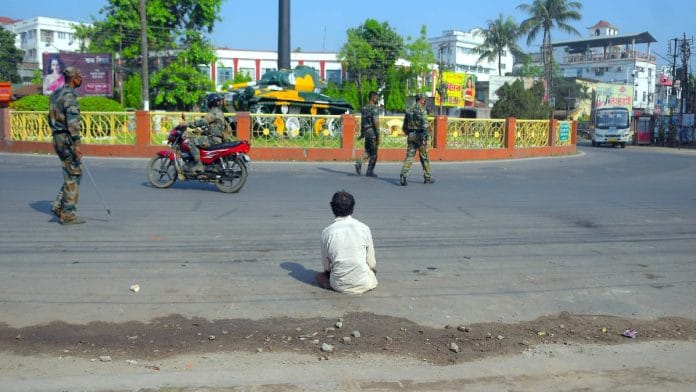New Delhi: The National Human Rights Commission (NHRC) has recommended that the Centre come up with a standardised format for developing a national database of people engaged in begging, as well a draft policy for their protection and rehabilitation, based on which states can prepare their “anti-begging framework”.
It also recommended that states take measures such as providing shelter, financial assistance, and skill training for social and financial inclusion to people engaged in begging.
The recommendations are part of the NHRC’s advisory issued Friday for the ‘Protection and Rehabilitation of Impoverished, Uneducated Children, Women, and Differently abled Individuals Engaged in Begging’. The human rights panel has asked the Centre, states and Union territories to submit their ‘Action Taken Report’ within two months.
According to the 2011 census, around 4.13 lakh people in India are engaged in begging. The human rights panel has said that the Ministry of Social Justice and Empowerment should come up with a standardised survey format to “build a national database” which has important information about beggars, including where they reside, disability, health issues etc.
“Upon completion of the identification process, the State to ensure that individuals engaged in beggary are brought to shelter homes (as mentioned under the SMILE scheme) located within cities or districts and are registered as residents,” the NHRC has recommended.
The Centre’s Support for Marginalised Individuals for Livelihood and Enterprise (SMILE) scheme, launched in 2022, lists measures to be taken for the rehabilitation of beggars and transgender persons. The scheme covers aspects ranging from shelter to skill training.
The panel has stressed on the need for a strong legal and policy framework to protect people, especially women and children, engaged in begging who often become victims of human trafficking.
For this, states and Union territories will have to play a proactive role and establish an “anti-begging framework”, the NHRC states.
“This may begin by first drafting a national policy for the protection and rehabilitation of individuals involved in beggary…The State to undertake a sociological and economic impact assessment and thereafter legislate an anti-human trafficking law to curb any racket of forced begging. This law should identify beggary as one of the root causes of human trafficking and insert penal offences against the perpetrators…to ensure complete prohibition of trafficking,” the advisory states.
Activists working for the welfare of those engaged in begging agreed that beggary is one of the root causes of human trafficking, and said there is a need for focused interventions.
Rajesh Kumar, executive director at the Society for Promotion of Youth & Masses (SPYM), a non-profit working with beggars and drug addicts, which also runs shelter homes in Delhi, said, “There is a need for focused interventions as it is not possible to rehabilitate all beggars. Our focus should be on old people, women and children, who are the most vulnerable. State governments and city administrations should work on ensuring that children and women are not found begging on the streets. Children found begging should be enrolled in schools.”
The NHRC has also recommended that children between the ages of 6 and 14 found begging should be enrolled in schools.
Also Read: PM’s economic advisor asks if India needs a new poverty line, says multidimensional index not enough
Support to earn livelihood
As part of the rehabilitation process and inclusion in society, beggars at government-run shelter homes should be provided support to earn their livelihood, the NHRC has said in its advisory.
The human rights panel has recommended that they be encouraged to form Self Help Groups (SHGs). “Authorities to coordinate with banks to provide loans to these SHGs by considering group guarantees as a collateral. The State to also facilitate benefits of government schemes meant for the welfare of SHGs.”
It further suggested states involve the banking sector to make beggars financially independent. “To ensure this, the State may also consider providing incentives or subsidies to banks for lending to these residents/SHGs. These incentives could include, loan guarantees, interest subvention or reimbursement for losses on loans to banks.”
State governments should also rope in NGOs, government-recognised vocational training institutes etc. to provide skill training to beggars, as well as provide them healthcare services, the advisory says.
(Edited by Gitanjali Das)
Also Read: Nearly 25 crore Indians moved out of multidimensional poverty in last 9 years, says NITI Aayog paper






